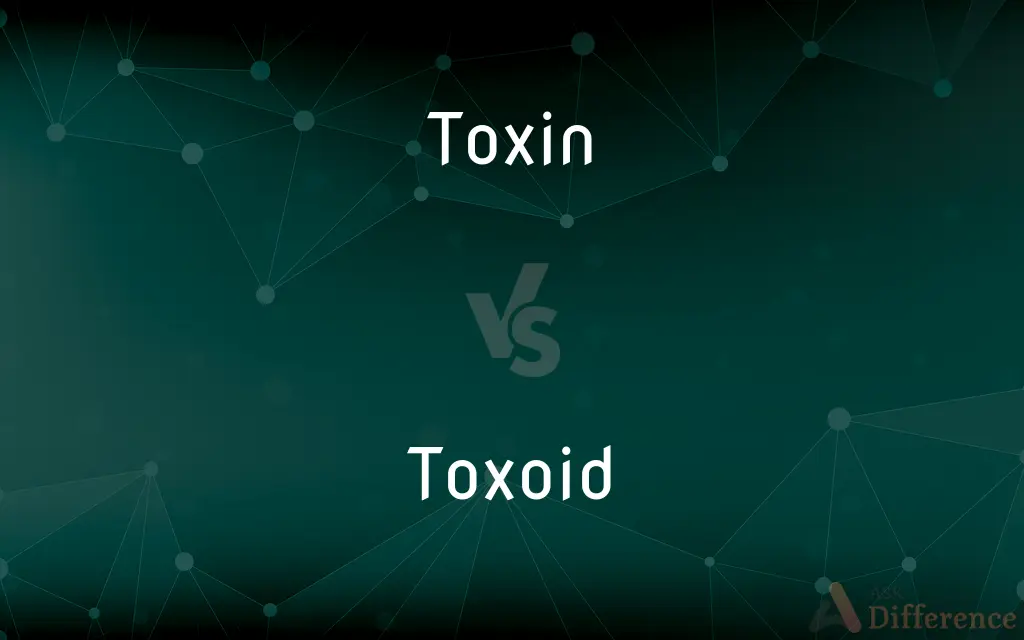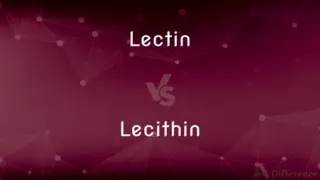Toxin vs. Toxoid — What's the Difference?
Edited by Tayyaba Rehman — By Urooj Arif — Updated on March 13, 2024
A toxin is a harmful substance produced by living organisms, while a toxoid is an inactivated toxin used in vaccines to stimulate an immune response without causing disease.

Difference Between Toxin and Toxoid
Table of Contents
ADVERTISEMENT
Key Differences
Toxins are poisonous substances produced by living organisms, such as bacteria, plants, and animals, capable of causing disease or injury when introduced to the body in sufficient quantities. Toxoids, on the other hand, are toxins that have been treated (usually with heat or chemicals) to weaken or eliminate their harmful properties without destroying their ability to stimulate the immune system, making them key components in certain vaccines.
The purpose of a toxin is often defense or predation for the producing organism, serving as a natural weapon against threats or prey. Conversely, toxoids are deliberately created by scientists for use in vaccines to safely expose the human immune system to a toxin, enabling it to build defenses without causing the actual disease.
While exposure to toxins can lead to negative health effects, ranging from mild allergic reactions to severe illness or death, depending on the type and amount of toxin, exposure to toxoids is generally safe and is an important tool in preventing diseases by providing acquired immunity.
Toxins can be categorized into various types, such as neurotoxins, cytotoxins, and enterotoxins, based on their target within the body and the effects they cause. Toxoids, however, are specifically categorized based on the toxin they are derived from and are named accordingly, such as tetanus toxoid derived from the tetanus toxin.
The development of toxoid-based vaccines has been a significant advancement in public health, allowing for the prevention of diseases that were once widespread and often fatal, such as diphtheria and tetanus. The use of toxins, however, is largely limited to their study for understanding disease mechanisms, developing antidotes, or in certain cases, for their potential therapeutic benefits in controlled doses.
ADVERTISEMENT
Comparison Chart
Definition
Poisonous substance produced by living organisms.
Inactivated toxin used in vaccines.
Origin
Bacteria, plants, animals.
Created from toxins through chemical or heat treatment.
Purpose
Natural defense or predation mechanism.
Stimulate immune response without causing disease.
Health Impact
Can cause disease or injury.
Provides immunity against diseases.
Examples
Botulinum toxin (from bacteria), Snake venom.
Tetanus toxoid, Diphtheria toxoid.
Compare with Definitions
Toxin
Toxins are produced by organisms as a defense or predation.
Botulinum toxin is produced by the bacterium Clostridium botulinum.
Toxoid
Inactivated toxins used to create vaccines.
The tetanus vaccine contains the tetanus toxoid.
Toxin
Exposure can lead to various health issues.
Snake venom can cause tissue damage and systemic effects.
Toxoid
Made by inactivating toxins with heat or chemicals.
Formaldehyde is often used to inactivate toxins for toxoid vaccines.
Toxin
Often disrupts normal cellular processes.
Some toxins block neurotransmitter release, leading to muscular paralysis.
Toxoid
Against toxin-producing bacteria.
Vaccines containing toxoids protect against diseases like tetanus and diphtheria.
Toxin
Antidotes or supportive care for toxin exposure.
Antivenom is used to treat snakebite envenomations.
Toxoid
Crucial for preventing certain infectious diseases.
Widespread use of toxoid vaccines has significantly reduced the incidence of diseases they target.
Toxin
Include neurotoxins, cytotoxins, etc.
Neurotoxins affect the nervous system, leading to symptoms like paralysis.
Toxoid
Induces immunity without causing disease.
Diphtheria toxoid stimulates the body to produce antibodies against the toxin.
Toxin
A poison of plant or animal origin, especially one produced by or derived from microorganisms and acting as an antigen in the body.
Toxoid
A toxoid is an inactivated toxin (usually an exotoxin) whose toxicity has been suppressed either by chemical (formalin) or heat treatment, while other properties, typically immunogenicity, are maintained. Toxins are secreted by bacteria, whereas toxoids are altered form of toxins; toxoids are not secreted by bacteria.
Toxin
A toxin is a harmful substance produced within living cells or organisms; synthetic toxicants created by artificial processes are thus excluded. The term was first used by organic chemist Ludwig Brieger (1849–1919), derived from the word toxic.Toxins can be small molecules, peptides, or proteins that are capable of causing disease on contact with or absorption by body tissues interacting with biological macromolecules such as enzymes or cellular receptors.
Toxoid
A substance that has been treated to destroy its toxic properties but retains the capacity to stimulate production of antitoxins, used in immunization.
Toxin
A poisonous substance, especially a protein, that is produced by living cells or organisms and is capable of causing disease when introduced into the body tissues but is often also capable of inducing neutralizing antibodies or antitoxins.
Toxoid
A toxin that has had its toxic properties removed, but retains its ability to generate an immune response.
Toxin
A poisonous or harmful nonbiological substance, such as a pollutant.
Toxoid
An altered form of a toxin, possessing little or no toxic power.
Toxin
(strictly) A toxic substance, specifically a poison produced by the biological processes of organisms.
Toxoid
A bacterial toxin that has been weakened until it is no longer toxic but is strong enough to induce the formation of antibodies and immunity to the specific disease caused by the toxin;
Diphtheria toxoid
Toxin
Synonym of toxicant: a toxic substance in a body requiring removal.
Toxin
A poisonous product formed by an organism, such as a pathogenic bacterium, a plant or an animal, usually having a high molecular weight, often a protein or a polysaccharide, but occasionally a low-molecular weight agent such as tetrodotoxin.
Toxin
A poisonous substance produced during the metabolism and growth of certain microorganisms and some higher plant and animal species
Common Curiosities
How does the body respond to a toxoid?
The body responds to a toxoid by producing antibodies specific to the toxin, providing immunity without causing the disease.
Can toxins have therapeutic uses?
Yes, in controlled doses, certain toxins can have therapeutic uses, such as Botulinum toxin used in medical and cosmetic treatments.
How do toxins cause harm?
Toxins cause harm by disrupting normal cellular functions, leading to various symptoms and potentially death, depending on the toxin and exposure level.
Can all toxins be converted into toxoids?
Not all toxins are suitable for conversion into toxoids; the process depends on the ability to inactivate the toxin without destroying its ability to elicit an immune response.
What are examples of diseases prevented by toxoid vaccines?
Diseases such as tetanus and diphtheria are prevented by vaccines that contain toxoids.
What role do toxoids play in public health?
Toxoids play a crucial role in public health by preventing diseases caused by toxin-producing bacteria, reducing morbidity and mortality associated with these diseases.
Is exposure to a small amount of toxin always harmful?
Small amounts of certain toxins can be harmless or cause only minor effects, but the impact depends on the specific toxin and individual susceptibility.
Why are toxoids used in vaccines?
Toxoids are used in vaccines to provide immunity against diseases caused by toxin-producing organisms, allowing the immune system to recognize and fight the actual toxin if exposed.
Are toxoids safe?
Yes, toxoids are safe as they have been inactivated and cannot cause the disease they are designed to protect against, though some individuals may experience mild side effects from the vaccine.
What is the main difference between a toxin and a toxoid?
A toxin is a harmful substance produced by living organisms, while a toxoid is an inactivated toxin used in vaccines to safely stimulate an immune response.
How are toxoids made?
Toxoids are made by treating toxins with chemicals or heat to inactivate their harmful properties while retaining their immunogenicity.
How long does immunity from a toxoid vaccine last?
Immunity duration varies; some toxoid vaccines require booster shots to maintain long-term immunity.
Can toxins be found in food?
Yes, certain foods can contain toxins, either naturally or due to contamination, such as certain mushrooms or improperly canned foods.
How are toxin exposures treated?
Treatments vary depending on the toxin but may include antitoxins, supportive care, and specific antidotes.
What advancements have been made in toxoid vaccine technology?
Advancements include combination vaccines, improved adjuvants, and better delivery systems, enhancing efficacy and reducing side effects.
Share Your Discovery

Previous Comparison
Fundamental vs. Basic
Next Comparison
Lectin vs. LecithinAuthor Spotlight
Written by
Urooj ArifUrooj is a skilled content writer at Ask Difference, known for her exceptional ability to simplify complex topics into engaging and informative content. With a passion for research and a flair for clear, concise writing, she consistently delivers articles that resonate with our diverse audience.
Edited by
Tayyaba RehmanTayyaba Rehman is a distinguished writer, currently serving as a primary contributor to askdifference.com. As a researcher in semantics and etymology, Tayyaba's passion for the complexity of languages and their distinctions has found a perfect home on the platform. Tayyaba delves into the intricacies of language, distinguishing between commonly confused words and phrases, thereby providing clarity for readers worldwide.
















































